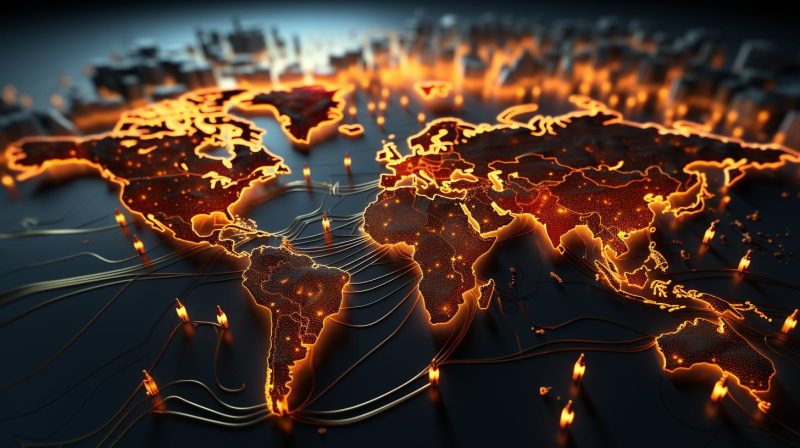
In the intricate labyrinth of global financial markets, one truth resonates louder each day: geopolitics is a formidable player. Its influence spans trade disputes to international conflicts, election results to policy changes, all contributing to market sentiment and global volatility.
The Art of Navigating Geopolitical Waters
The complex tapestry of geopolitics involves the interplay between politics, geography, and international relations. It’s about understanding how nations and their policies shape and are shaped by each other and the global economy[1].
[1] Geopolitics
Geopolitics and Trading: An Intricate Dance
Trade disputes and economic sanctions paint a clear picture of how geopolitical events rattle financial markets. The US-China trade war, ignited in 2018 under the Trump administration, stands out. Tariffs slapped on billions of dollars’ worth of goods disrupted global supply chains, hitting sectors from technology to agriculture. The ripple effects caused stock price fluctuations and market volatility, giving traders worldwide a bumpy ride.
Political shifts also sway the markets. Take the Brexit referendum in 2016 as a case study. The UK’s dramatic exit from the European Union sowed seeds of market uncertainty, which saw the British pound nosedive. Savvy traders, attuned to these political tremors, could tweak their trading strategies to stay afloat.
Wars and conflicts, too, leave an indelible mark on commodities markets, especially oil. Consider the 1990 Gulf War; oil prices soared as traders braced for supply chain disruptions. Navigating such geopolitical upheavals can help traders hedge against risks or seize opportunities in volatile markets.
Bracing for Geopolitical Storms
A diversified portfolio is a trader’s shield against geopolitical surprises. A blend of different asset classes, sectors, and geographies can minimize exposure to geopolitical hotspots[2].
Staying in the loop is vital. A keen eye on global news, an understanding of the geopolitical climate, and anticipation of policy changes can offer traders an upper hand in managing geopolitical risks.
[2] Diversification
Closing Thoughts
In our globalized world, geopolitics and trading are entwined like never before. Grasping the impact of geopolitical events on financial markets empowers traders to manage their risks and potentially turn market volatility to their advantage. Success in trading isn’t only about understanding financial markets; it’s about appreciating the wider global stage on which they perform.
No one expects traders to morph into geopolitical gurus overnight. But staying informed and understanding how major geopolitical events can affect your portfolio and trading strategy will offer a sturdier footing in the financial arena.
Grasping the complexities of geopolitics and trading isn’t an overnight task—it demands continuous learning and adaptability. But with knowledge as their compass, traders can make informed decisions and take calculated risks in a world where finance and politics are inextricably linked.
As the world turns, the intersection of geopolitics and financial markets continues to mold our global economy. For traders, it underscores the necessity of comprehending these influences and adjusting their strategies to match the changing times.
FAQs
How can geopolitics impact my crypto trading?
In a big way! Geopolitical events like elections or conflicts can cause dramatic shifts in the market, impacting crypto prices. Be ready for volatility!
Are all cryptos affected by geopolitics?
Not always. Bitcoin often acts as a “digital gold”, a safe haven asset. But altcoins may react differently based on their unique use cases and market perception.
How can I stay updated on geopolitical events?
I’d recommend setting Google Alerts for key terms, following international news outlets, and being active in crypto communities. Stay woke, cryptonauts!
Can geopolitical risks be predicted?
It’s tough, no crystal ball here! But by keeping an eye on world events and understanding market sentiment, you can anticipate potential risks.
How do sanctions affect crypto markets?
They can create serious FUD (Fear, Uncertainty, Doubt) and potentially cause a sell-off. But they can also increase demand in sanctioned countries, leading to interesting price actions.
How should I adjust my trading strategy in response to geopolitics?
Diversify, be nimble, and consider hedging. It’s not all about HODLing, it’s also about navigating the waves of geopolitical sea monster.
Does geopolitics impact DeFi?
Absolutely! Regulations, sanctions, and even elections can influence DeFi protocols and tokens. Keep a close eye on your DeFi plays, matey!
Can I use geopolitics to predict the next Bitcoin bull run?
You might! Crisis events often lead to market shifts. So if you’re adept at reading the geopolitical tea leaves, you could score a big win.
Are certain regions more influenced by geopolitics in crypto trading?
Yes, countries with heavy crypto regulation or high economic uncertainty can see more volatility. Understanding regional dynamics is key to playing the global chessboard of crypto.
Can geopolitical events create arbitrage opportunities?
For sure! Price discrepancies can pop up between different geographical markets during major events. Just remember, arbitrage is a high skill, high risk maneuver.
How does geopolitics affect ICOs?
Big time! Regulations, political climate, and international relations can all impact an ICO’s success. When you’re ICO-hunting, don’t forget to put on your geopolitical goggles!
Is geopolitics all bad news for crypto traders?
Not at all! While it adds a layer of complexity, it also creates opportunities for savvy traders to capitalize on. Keep calm and trade on!
